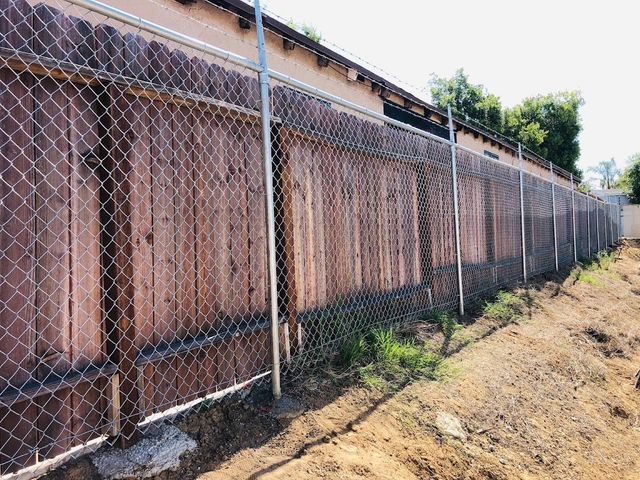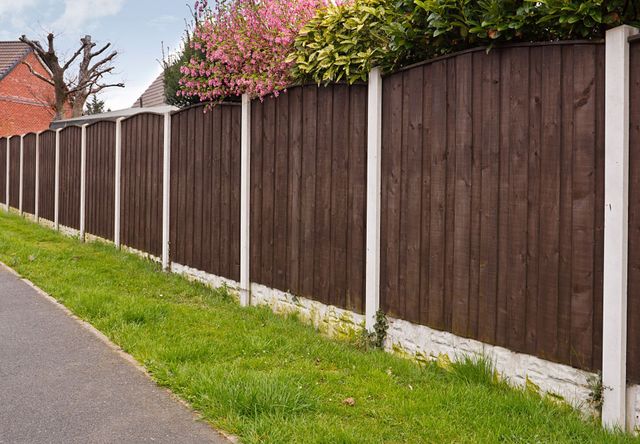All Categories
Featured
Picking the right fence product for your home is a significant decision, and each alternative comes with its very own set of advantages and challenges. Wood, plastic, and light weight aluminum are amongst one of the most prominent materials for both residential and business secure fencing. Right here's a malfunction of the pros and disadvantages of each to assist you make a decision which is ideal for your demands.
Timber Fence. Pros:
Aesthetic Allure: Wood supplies an ageless, natural look that enhances almost any kind of design of home. It can be painted or stained in a large variety of colors, allowing for total customization. Whether you're aiming for a rustic, country-style look or a much more refined and polished look, wood is flexible.
Economical: Generally, wood fences are one of the most budget-friendly alternatives when it pertains to upfront prices. It's a great choice for those on a budget plan that desire a high quality fencing without a high price.
![]()
Modification: Timber can be easily adapted to fit any kind of form or dimension. You can choose from various designs such as privacy, picket, or ranch-style fences. It's likewise simple to modify, fix, or change components if essential.
Cons:
Maintenance: Wood fences need normal maintenance. They should be stained or painted periodically to stop bug, rot, or bending invasion. Without upkeep, timber can wear away faster, particularly in damp or damp climates.
Sensitivity to Damage: Timber is vulnerable to harm from insects, such as termites, and climate condition, like high winds, rain, or snow. Gradually, exposure to these elements can cause the wood to crack, splinter, or warp.
Shorter Life expectancy: While wood fencings can last for several years, they usually have a shorter life expectancy contrasted to vinyl or aluminum, specifically if not maintained routinely.
Plastic Secure Fencing. Pros:
Reduced Maintenance: Among the most eye-catching functions of plastic fencings is that they need little to no maintenance. Unlike wood, vinyl doesn't need to be painted or tarnished. It's immune to fading, splitting, and warping, making it suitable for those who desire an easy fencing.
Longevity: Plastic fences are incredibly durable and can hold up against harsh climate condition, including extreme heat, hefty rainfall, or snow. They're also immune to insects like termites, which can destroy timber fences.
Lengthy Life-span: Vinyl fences can last for 20-30 years or more with marginal upkeep. Lots of producers provide service warranties, supplying peace of mind and more boosting the value of your investment.
![]()
Variety of Styles: Offered in a series of textures, colors, and styles, vinyl fences can imitate the look of timber however without the upkeep. They are readily available in designs like privacy, picket, and ornamental, making them highly customizable.
Cons:
Greater First Expense: The in advance expense of plastic fence is usually more than wood, making it much less budget-friendly for some. Nonetheless, its long life and low upkeep make it a worthwhile investment in the long run.
Breakable in Winter: In chillier climates, plastic can end up being fragile in time, that makes it extra prone to fracturing if based on influence. This might be a problem in areas with severe winters months.
Restricted Modification: While plastic comes in a selection of styles and colors, it's not as personalized as timber. If you have an extremely particular vision in mind, plastic might not be the best selection.
Light Weight Aluminum Fencing. Pros:
Reduced Maintenance: Light weight aluminum is another product that requires really little maintenance. Unlike wood, it does not corrosion, wear away, or discolor. This makes it suitable for atmospheres with severe weather condition or seaside locations where saltwater might cause rust.
Longevity: Light weight aluminum fences are known for their strength and lengthy lifespan. They can stand up to rough climate, and unlike timber or plastic, they are resistant to pests and will not deteriorate with time.
![]()
Visual Appeal: Light weight aluminum fencings offer a smooth, sophisticated appearance and are typically utilized for ornamental functions. They are readily available in numerous designs and finishes and can boost the overall aesthetic charm of your building.
Safety: Aluminum is a strong product, making it an exceptional alternative for offering safety and security around your building. It's usually made use of for household protection fencing as well as for pool rooms.
Cons:
Cost: Aluminum fences are typically much more expensive than wood and in some cases even plastic, specifically when selecting ornamental or personalized designs. The initial price might be a deterrent for some homeowner.
Less Privacy: One of the drawbacks of aluminum is that it normally provides less personal privacy contrasted to wood or vinyl. The voids in between the slats or bars can be broad, which enables people to see via the fence. This may not be the best choice. if personal privacy is important to you.
Nicking: While aluminum is long lasting, it is at risk to denting from heavy influences, such as car accidents or criminal damage. While it will not corrosion, a damage can jeopardize its appearance and stability.
Which Material Should You Choose? The decision between timber, vinyl, and aluminum secure fencing boils down to your budget, the amount of upkeep you're prepared to handle, and the details needs of your building. If you prefer a natural, customizable look and want to keep it, timber could be the method to go. Plastic supplies excellent advantages if you focus on sturdiness, long life, and low-maintenance care. For those who want a classy, high-end look with very little upkeep, light weight aluminum is an excellent alternative.
Consider your building's climate, the degree of personal privacy or safety and security you need, and the long-lasting financial investment you want to make. Whichever material you pick, each deals special advantages that can improve your home or organization while offering performance and design.
Timber Fence. Pros:
Aesthetic Allure: Wood supplies an ageless, natural look that enhances almost any kind of design of home. It can be painted or stained in a large variety of colors, allowing for total customization. Whether you're aiming for a rustic, country-style look or a much more refined and polished look, wood is flexible.
Economical: Generally, wood fences are one of the most budget-friendly alternatives when it pertains to upfront prices. It's a great choice for those on a budget plan that desire a high quality fencing without a high price.

Modification: Timber can be easily adapted to fit any kind of form or dimension. You can choose from various designs such as privacy, picket, or ranch-style fences. It's likewise simple to modify, fix, or change components if essential.
Cons:
Maintenance: Wood fences need normal maintenance. They should be stained or painted periodically to stop bug, rot, or bending invasion. Without upkeep, timber can wear away faster, particularly in damp or damp climates.
Sensitivity to Damage: Timber is vulnerable to harm from insects, such as termites, and climate condition, like high winds, rain, or snow. Gradually, exposure to these elements can cause the wood to crack, splinter, or warp.
Shorter Life expectancy: While wood fencings can last for several years, they usually have a shorter life expectancy contrasted to vinyl or aluminum, specifically if not maintained routinely.
Plastic Secure Fencing. Pros:
Reduced Maintenance: Among the most eye-catching functions of plastic fencings is that they need little to no maintenance. Unlike wood, vinyl doesn't need to be painted or tarnished. It's immune to fading, splitting, and warping, making it suitable for those who desire an easy fencing.
Longevity: Plastic fences are incredibly durable and can hold up against harsh climate condition, including extreme heat, hefty rainfall, or snow. They're also immune to insects like termites, which can destroy timber fences.
Lengthy Life-span: Vinyl fences can last for 20-30 years or more with marginal upkeep. Lots of producers provide service warranties, supplying peace of mind and more boosting the value of your investment.

Variety of Styles: Offered in a series of textures, colors, and styles, vinyl fences can imitate the look of timber however without the upkeep. They are readily available in designs like privacy, picket, and ornamental, making them highly customizable.
Cons:
Greater First Expense: The in advance expense of plastic fence is usually more than wood, making it much less budget-friendly for some. Nonetheless, its long life and low upkeep make it a worthwhile investment in the long run.
Breakable in Winter: In chillier climates, plastic can end up being fragile in time, that makes it extra prone to fracturing if based on influence. This might be a problem in areas with severe winters months.
Restricted Modification: While plastic comes in a selection of styles and colors, it's not as personalized as timber. If you have an extremely particular vision in mind, plastic might not be the best selection.
Light Weight Aluminum Fencing. Pros:
Reduced Maintenance: Light weight aluminum is another product that requires really little maintenance. Unlike wood, it does not corrosion, wear away, or discolor. This makes it suitable for atmospheres with severe weather condition or seaside locations where saltwater might cause rust.
Longevity: Light weight aluminum fences are known for their strength and lengthy lifespan. They can stand up to rough climate, and unlike timber or plastic, they are resistant to pests and will not deteriorate with time.

Visual Appeal: Light weight aluminum fencings offer a smooth, sophisticated appearance and are typically utilized for ornamental functions. They are readily available in numerous designs and finishes and can boost the overall aesthetic charm of your building.
Safety: Aluminum is a strong product, making it an exceptional alternative for offering safety and security around your building. It's usually made use of for household protection fencing as well as for pool rooms.
Cons:
Cost: Aluminum fences are typically much more expensive than wood and in some cases even plastic, specifically when selecting ornamental or personalized designs. The initial price might be a deterrent for some homeowner.
Less Privacy: One of the drawbacks of aluminum is that it normally provides less personal privacy contrasted to wood or vinyl. The voids in between the slats or bars can be broad, which enables people to see via the fence. This may not be the best choice. if personal privacy is important to you.
Nicking: While aluminum is long lasting, it is at risk to denting from heavy influences, such as car accidents or criminal damage. While it will not corrosion, a damage can jeopardize its appearance and stability.
Which Material Should You Choose? The decision between timber, vinyl, and aluminum secure fencing boils down to your budget, the amount of upkeep you're prepared to handle, and the details needs of your building. If you prefer a natural, customizable look and want to keep it, timber could be the method to go. Plastic supplies excellent advantages if you focus on sturdiness, long life, and low-maintenance care. For those who want a classy, high-end look with very little upkeep, light weight aluminum is an excellent alternative.
Consider your building's climate, the degree of personal privacy or safety and security you need, and the long-lasting financial investment you want to make. Whichever material you pick, each deals special advantages that can improve your home or organization while offering performance and design.
Latest Posts
Reliable Industrial Roofing Solutions by Weathercraft
Published May 27, 25
1 min read
How Regular Auto Maintenance at Montclare Auto Repair Keeps Your Wallet Happy
Published May 26, 25
1 min read
Find Premier Car Repair Solutions in Chicago – Expert Care for Your Vehicle
Published May 25, 25
1 min read
More
Latest Posts
Reliable Industrial Roofing Solutions by Weathercraft
Published May 27, 25
1 min read
How Regular Auto Maintenance at Montclare Auto Repair Keeps Your Wallet Happy
Published May 26, 25
1 min read
Find Premier Car Repair Solutions in Chicago – Expert Care for Your Vehicle
Published May 25, 25
1 min read